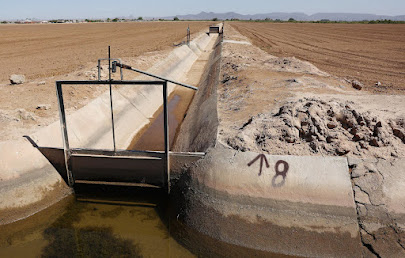 |
Voluntarily fallowed fields at the Fort Yuma Indian Reservation, home of the Quechan Tribe, in May. (Photo by Mario Tama/Getty Images via The Washington Post) |
"The decision by Arizona in the past week to limit residential construction in some parts of the fast-growing Phoenix suburbs is another major warning about how climate change is disrupting lifestyles and economies in the West," the Post reports. "Throughout the region, glaciers have receded, wildfires have expanded, and rivers and lakes have shrunk. It has been a wet winter, but the deeper trends brought on by the warming atmosphere persist."
And it's not mainly about surface water, the Post notes: "Jay Famiglietti moved to Arizona to study how the worst drought in a millennium was sapping groundwater beneath the American West. . . . He has documented that states along the Colorado River were losing their aquifers far faster than the more visible shriveling of the nation's largest reservoirs. Famiglietti told the Post: "I don't think that people and this is everyone, the general public, but right up to our water managers and elected officials, really understand now that groundwater is the key to our future."
The Post explains, "Groundwater can take thousands of years to replenish once it has been sucked out. . . Such shortages are likely to reshape, in coming decades, where people live and how much they pay to do so." The Southwest does have options, and some are working. The Post reports, "Over the past two decades, Nevada has reduced by 30 percent the portion of the Colorado River's water that it uses, even as the population has grown. Las Vegas lawns have been ripped out and replaced by cactus, gravel and artificial turf. . . . Addressing climate changes "also means more money and focus on costly solutions — facilities that remove salt from seawater; pipelines bringing in water from wetter parts of the country. Arizona's prior governor, Doug Ducey, created a $1 billion fund for pursuing such projects. His former natural resources adviser, Chuck Podolak, now leads that effort at the Water Infrastructure Finance Authority of Arizona. Podolak told the Post: "Finding new water seems like a relatively doable task compared to holding back the oceans in Miami or trying to stop hurricanes from coming into Houston."
No comments:
Post a Comment